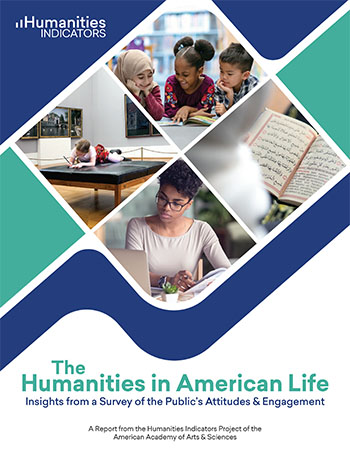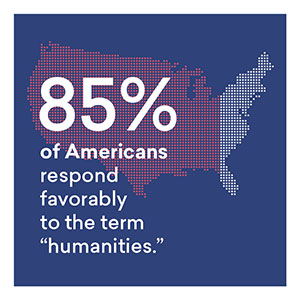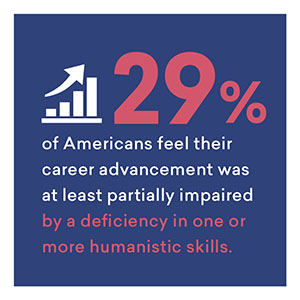
In fall 2019 the American Academy of Arts and Sciences’ Humanities Indicators project, with funding from The Andrew W. Mellon Foundation, administered the first nationally representative survey dedicated to understanding Americans’ engagement with and attitudes toward the humanities. The survey asked a representative sample of 5,015 American adults, age 18 and above (in a sample drawn from NORC at the University of Chicago’s AmeriSpeak panel) how often they engage in different humanities activities and what they believe the humanities contribute to the American experience.
For the purposes of this study, the term humanities encompassed more than the academic disciplines associated with the field. The survey included questions about a wide array of activities in which Americans engage as part of their personal and work lives, such as: early childhood reading; K–12 humanities education; later-in-life engagement with the humanities through books, the internet, television, and cultural institutions; and descriptive writing on the job.
The detailed overview report (and a related At a Glance summary) offers four broad insights:

- There is substantial engagement with the humanities in American life. However, very few people engage regularly in the full range of activities, or even in all the activities associated with a given discipline (e.g., someone who watches history shows is not very likely to also research history topics online).
- Though Americans hold a generally favorable view of the humanities, especially as an area of education, their enthusiasm is relatively attenuated in comparison to other intellectual fields and even to some of the humanities’ component disciplines (especially history).
- Many Americans do not recall being exposed to the humanities by their parents, and most adults wished they had taken more humanities courses in school.
- And finally, a substantial share of Americans has been hampered at work due to a deficiency in one or more humanities skills, though the survey also reveals that many Americans do not think they need humanities skills in the workplace.

The survey revealed that a substantial majority of Americans believes the humanities confer personal, societal, and economic benefits. The study also found considerable engagement in a range of humanities activities at home and in the workplace, as well as strong support for teaching humanities subjects in the schools. The survey detected relatively little agreement with a variety of negative statements about the field, such as “cost[s] too much” or is “a waste of time.”
Alongside the notable findings for the field as a whole, the report also details a wide array of interesting variations in attitudes about and engagement with the disciplines that comprise the academic humanities. For specialists in those subjects, Humanities Indicators staff prepared additional summaries of the findings of the survey that pertain to:
For additional details on the survey methodology, see the report Appendix, as well as the Field Report and Card from NORC at the University of Chicago.
If you would like to receive a print copy of the report, please fill out the request form. And if you have any other questions about the survey findings and methodology, or suggestions for the next iteration of the survey, please contact Robert Townsend, the Codirector of the Humanities Indicators and Director of the Academy's Washington Office.